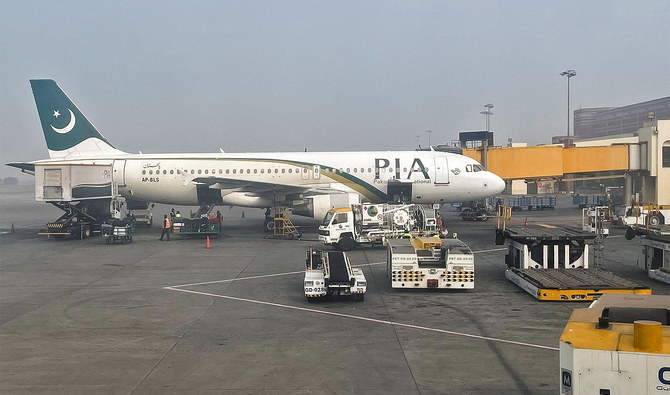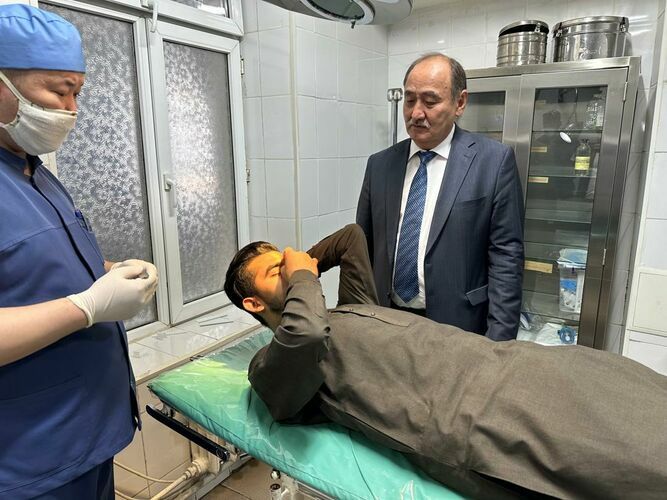ISLAMABAD: Ahead of elections next week, Pakistan’s caretaker administration is making binding plans for a new government to sell loss-making Pakistan International Airlines, according to the minister in charge of the process and other officials.
In the past, elected governments have shied away from undertaking unpopular reforms, including the sale of the flag carrier. But Pakistan, in deep economic crisis, agreed in June to overhaul loss-making state-owned enterprises under a deal with the International Monetary Fund (IMF) for a $3 billion bailout.
The government decided to privatise PIA just weeks after signing the IMF agreement.
The caretaker administration, which took office in August to oversee the Feb. 8 election, was empowered by the outgoing parliament to take any steps needed to meet the budgetary targets agreed with the IMF.
“Our job is 98 percent done,” Privatization Minister Fawad Hasan Fawad told Reuters when asked about the plan to sell the airline. “The remaining 2 percent is just to bring it on an excel sheet after the cabinet approves it.”
Fawad said the plan, drawn up by transaction adviser Ernst & Young, will be presented to the cabinet for approval before the tenure of the administration ends following the election. The cabinet will also decide whether to sell the stake by tender or through a government-to-government deal, Fawad said.
“What we have done in just four months is what past governments have been trying to do for over a decade,” Fawad said. “There is no looking back.”
Details of the privatization process have not been previously reported.
PIA had liabilities of 785 billion Pakistani rupees ($2.81 billion) and accumulated losses of 713 billion rupees as of June last year. Its CEO has said losses in 2023 were likely to be 112 billion rupees.
Progress on the privatization will be a key issue if the incoming government goes back to the IMF once the current bailout program expires in March. Caretaker Finance Minister Shamshad Akhtar told reporters last year that Pakistan would have to remain in IMF programs after the expiry.
Two sources close to the process told Reuters that a 51 percent stake with full management control would be offered to buyers after parking the airline’s debts in a separate entity, under the 1,100 page report from Ernst & Young.
Reuters could not independently confirm the contents of the report. Fawad did not give specific details of the size of the stake to be sold, but confirmed the plan involved the carrier’s debts being spun off into a separate entity.
Ernst & Young did not respond to requests for comment.
PIA spokesman Abdullah Hafeez Khan said the airline was assisting the privatization process, extending “full cooperation” to the transaction adviser.
Fast-tracked
Besides operational and technical measures for PIA’s divestment, the caretaker government has also amended a 2016 law that had blocked selling off its majority shares, according to a draft posted on the Pakistan parliament’s website.
The Pakistan Muslim League-Nawaz party of former Prime Minister Nawaz Sharif is tipped by analysts to win the election with support from the powerful military. Its main political rival has been decimated by the arrest of its leader Imran Khan and a crackdown on its members.
Sharif’s close aide Ishaq Dar, who has been his finance minister previously and has been named by the party to retain the portfolio if it forms the next government, told Reuters that the sale of PIA will be fast-tracked.
“It will, God willing, move ahead with fast speed,” he said.
In a report in mid-January, the IMF expressed satisfaction over the measures initiated by the caretaker government to accelerate reforms of state-owned enterprises, specifically mentioning the amendment of the PIA privatization law.
Under the privatization plan submitted by Ernst & Young to the government on Dec. 27, government-guaranteed legacy debt and payables — which are held by a consortium of seven domestic banks — will be parked in a holding company, Fawad and two sources involved in the process said.
Fawad said the government and the consortium had an agreement in place regarding the settlement of the legacy debt, which includes negative equity of 825 billions rupees in loans, creditors’ money and the losses. He provided no further details.
The sources had earlier said the banks wanted a five-year bond issued against the debt with a 16.5 percent coupon on the paper, while the finance ministry was offering only 10 percent.
The banks have not commented on the deal.
Besides its losses and debt, PIA’s governance and safety standards have been questioned by global aviation authorities for some years.
In early 2020, Czech and Hungarian air force jets were scrambled to intercept a PIA flight with 300 people on board as it went astray due to an “avoidable human error” by its pilot, according to a previously unreported confidential report by a PIA inquiry board, which was reviewed by Reuters.
In May that year, the crash of a PIA plane in Karachi killed nearly 100 people and a fake pilot license scandal erupted later in 2020.
The scandal led to the European Union Aviation Safety Agency (EASA) banning the airline from flying to its most lucrative routes in Europe and the UK.
The 2020 ban is still in place and has cost the airline nearly 40 billion rupees in revenue annually, according to government records presented in parliament.
The airline has been pleading with EASA to lift the ban even provisionally, but to no avail, according to correspondence between it and PIA reviewed by Reuters.
Pakistan’s financial crisis has also led to seizure of PIA aircraft by creditors in recent months, according to the airline. One aircraft was taken at Kuala Lumpur airport for non-payment of lease fees, and another in Toronto for non-payment of ground handling, PIA said.
While the airline awaits the government’s decision on a sale, it continues to need financial support: 23.7 billion rupees are required to keep it afloat for another five to six months before control is given to a new buyer, three government and PIA sources said.
Challenging sale
Not everyone agrees with pressing ahead speedily with the sale.
Three senior airline officials who spoke to Reuters on condition of anonymity said a fast sale could devalue the airline’s worth, and that it would not be a transparent transaction without due diligence.
“We are not against its privatization, and all we want is that you don’t just throw it away,” said one of the officials.
But Singapore-based aviation analyst Brendan Sobie said PIA is in dire straits: the plan submitted to the government was “essentially the only option to save the airline.”
“The privatization will be challenging and a sale is likely not possible unless it first undergoes a deep restructuring and the debts are cleared,” he said.
PIA’s assets include key slots at the world’s busiest airports and air routes to top European destinations, the Middle East and North America.
PIA has air service agreements with more than 150 countries and generates about 280 billion rupees annually in revenues despite the EU ban, airline records show.
It has 10 slots at Heathrow, which, according to two PIA officials, are currently worth 70 billion rupees annually. It has a further nine slots at Manchester and four at Birmingham.
Turkish and Kuwaiti airlines have been operating 70 percent of the slots under a business arrangement with PIA that also allows the airline to retain them, the PIA officials said.
Separately, PIA’s physical assets, which include aircraft, hotels in Paris and New York and other properties, are worth 105.6 billion rupees ($375 million) as per book value, according to the airline’s annual report for 2023.
PIA officials, however, said the market value of the assets could be above $1 billion. In any case, the hotels and other properties would not be up for sale, they said.

















